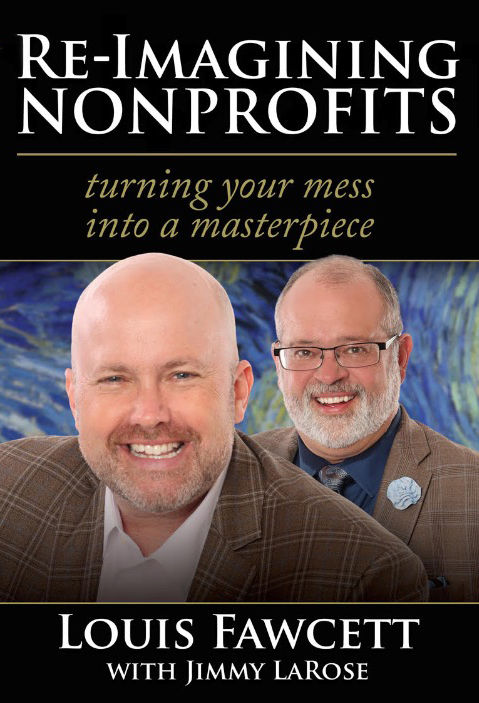
NANOE HotelPlanner Travel Provider of Choice
September 15, 2023
Why Your Nonprofit Should Do Public Opinion Research
September 20, 2023Nonprofits North of Richmond w Louis Fawcett & Jimmy LaRose
Nonprofits North of Richmond is a chat between Louis Fawcett & Jimmy LaRose as they confront charity’s IVORY TOWER ELITES who better themselves at the expense of community organizations. Understand why leading national nonprofit association executives pass down self-serving demands to their “lessors” in a vain attempt to control their independent free-thinking colleagues.
Here’s what Fawcett & LaRose have to share:
 Jimmy: Louis, you and I have spent the last decade performing a moral inventory within the nonprofit sector. We’ve proven empirically what’s not working and comprehend the scope of our sector’s mess. You are president of the National Association of Nonprofit Organizations and Executives (NANOEE) as well as the author of the new book RE-IMAGINING NONPROFITS: Turning Your Mess into a Masterpiece. When this book is released our national member associations and networks are going to push back. They will not have it. There will be blowback. Over the past ten years together we’ve forayed into this maelstrom and we’re just a little bit overwhelmed by the vitriolic improper response from different industry groups. Louis, I’d love to hear you talk about that and what you think people’s response is going to be, negative or positive to RE-IMAGINING NONPROFITS.
Jimmy: Louis, you and I have spent the last decade performing a moral inventory within the nonprofit sector. We’ve proven empirically what’s not working and comprehend the scope of our sector’s mess. You are president of the National Association of Nonprofit Organizations and Executives (NANOEE) as well as the author of the new book RE-IMAGINING NONPROFITS: Turning Your Mess into a Masterpiece. When this book is released our national member associations and networks are going to push back. They will not have it. There will be blowback. Over the past ten years together we’ve forayed into this maelstrom and we’re just a little bit overwhelmed by the vitriolic improper response from different industry groups. Louis, I’d love to hear you talk about that and what you think people’s response is going to be, negative or positive to RE-IMAGINING NONPROFITS.
Louis: Thanks so much, Jimmy. Thanks for spending time with me. Yeah, it’s fascinating when we when we think about NONPROFITS NORTH OF RICHMOND who think that they can tell people across the country what to think, what to do, how to believe and how to address the problems they face every day in their communities. And and the problem is they continue to push norms in the nonprofit sector that are decades old, 40, 50, 60 years old that don’t work anymore. The world has shifted, demographics have shifted and people are not stupid. When you continue to give them things that don’t work and then punish them when the very things you’re giving them continue not to work. Jimmy, there’s a better way, there’s a different way. It’s unbelievable to me.
First of all, the piety in the nonprofit sector that needs to be dispelled, that somehow nonprofits are different than businesses. They aren’t. If you can’t run a business, then you can’t run a nonprofit. And so often what we do is we put people in leadership roles because they have a good heart or because they’re hard working. And those are good things. But it doesn’t mean they know how to run a business. And if we’re really going to make a difference in our communities, if we’re really going to stop fentanyl poisoning and veteran suicide and homelessness, if we’re really going to to make a dent in literacy and make sure kids can graduate high school and help the more than 150 million orphans across the world, if we’re going to do that, we’re going to need money. A LOT OF MONEY TO SOLVE PROBLEMS COMPLETELY INSTEAD OF JUST SERVICE THEM.
And in order to get that money, we’re going to have to change our way of thinking about our donors and begin to treat them like customers. Businesses invest in their customers because they know that’s where their revenue is generated. Nonprofits need to invest in their donors, sit down with them, listen to them, help serve their needs to change their communities. Jimmy, you and I talk to philanthropists every day, and these are not arrogant, rich, wealthy elites. These are everyday people who have been successful, and now they want to give back and they’re passionate and they’ve got some of the solutions. But what they’re confronted with over and over again is this mess in the nonprofit sector where they invest money, their promises are made and not kept. Money is invested and they don’t see the return on that investment.
In the nonprofit sector the return on investment is CHANGED AND SAVED LIVES. And the more money we have, the more lives we can change and save. This is only going to happen If we’re willing to put aside the piety and begin to run nonprofits like businesses.
Nonprofits North of Richmond w Louis Fawcett & Jimmy LaRose
Jimmy: Louis, just a second ago, you made a cultural reference. I think we’re going to call this particular chat Nonprofits North of Richmond. I think you got that from Oliver Anthony’s, Rich Men North of Richmond. How do you see that viral moment applying to the nonprofit sector?
Louis: Well, here’s what’s fascinating, Jimmy. I’m from a small town called Farmville, Virginia. I grew up in rural Virginia, 7000 people. And I grew up with the values of hard work, patriotism, working together to solve problems and get things done. And I learned early on that no one else gets to tell you what to think and what to believe. You get to determine that for yourself. And I’m fascinated now that Oliver Anthony has come out with Rich Men North of Richmond. And he’s from Farmville, my hometown! Now, I don’t know him. I’ve never met him. I didn’t grow up with him. But he’s from Farmville and his timing is uncanny. He sings, “I’ve been selling my soul, working all day, and it’s a shame what the world has gotten to for people like me and people like you. I wish I could wake up and it not be true. But it is. Oh it is.”
Rich Men North of Richmond by Oliver Anthony
 Jimmy, I wish I could wake up and this mess of the nonprofit sector not be true. I wish that I didn’t have to talk every day to nonprofit leaders who are suffering under the yoke of the establishment, who are suffering under being told that they have to continue to follow things that don’t work. Oliver Anthony continues, “These rich men North of Richmond. Lord knows they all just want to have total control. They want to know what you think, want to know what you do. And they don’t think you know. But I know that you do.”
Jimmy, I wish I could wake up and this mess of the nonprofit sector not be true. I wish that I didn’t have to talk every day to nonprofit leaders who are suffering under the yoke of the establishment, who are suffering under being told that they have to continue to follow things that don’t work. Oliver Anthony continues, “These rich men North of Richmond. Lord knows they all just want to have total control. They want to know what you think, want to know what you do. And they don’t think you know. But I know that you do.”
Unfortunately, in the nonprofit establishment, that’s what we’re facing, these headquartered ivory tower elites, whether they are in Alexandria or D.C. or New York, and they think they know better than we do. They think they’re more educated, they’re more evolved, and that they can tell us what to do. Now, this is not about north versus south. I know I have a Southern accent. I’m not talking about geography. I’m talking about attitude. And I work with incredible people in New York and New Jersey and in Boston, in Seattle, in California, who are certainly not from the South, but they have a heart for changing and saving lives. And they’re tired of these ivory tower elites. You know the type, maybe they went to an Ivy League school. And so they think that they’re smarter than everyone. You know, maybe they went to Harvard or Yale or Cornell or somewhere like that. Or maybe they grew up in a in a cushy private school setting. it’s just been ingrained in them to look down on people and to think, well, we know how it should be done. You just need to listen to us. And that’s not the way the world works. The people who know the solutions are the people who are living day in and day out in small communities, in urban centers, because they talk to their neighbors, they talk to other community leaders. They have the solutions, but they’re being held back by the establishment of the nonprofit sector.
Jimmy: Louis, NANOE has grown under your leadership. As its president, we know that our mission is to ensure the same free market enterprise principles we know work in the for-profit sector are given as gifts to the nonprofit sector. And for some reason, because we’ve taken that position, we find that the national networks, the establishment comes out and says things that take our breath away. It’s as though, if we say, “the sky is blue” they will then send out an email to everybody saying, “the sky is green!”
I keep trying to figure out how people, beset with avarice, consumption and greed, would put themselves in that position? Last week you called me and spoke to the bubble that they’re in and what their goals are within that bubble. Can I get you to speak to that again?
Louis: Yeah, it’s natural when you get a job working for an established headquarters that you want to move up the ladder. I don’t blame people for wanting to advance their careers. I don’t blame people for wanting to make more money. In fact, I think all nonprofit executives and workers and leaders should be paid much more than they’re being paid now. So I get it. It’s a natural tendency to want to climb the corporate ladder. Here’s the problem — they think they can climb the ladder by toeing the party line, and the party line doesn’t work anymore. And so they want to tell us how we should do things. It’s like, you know, they want us to go back to driving a Model T. It’s like they’re. They’re angry at Tesla. Um. And, you know, we saw that in the automotive industry, right? I mean, Elon Musk came out with a new business model and the traditional automotive dealers rebelled. They didn’t like his new business model. They told him he couldn’t do it that way.
So, this is nothing new, Jimmy, throughout the history of humanity people find themselves in a position of power and they lord it over other people. And when they begin to feel that power slipping away, then they assert control. Then they begin to bully. Then they begin to make you toe the party line because they’re worried that their power is going to slip away, that somehow their job title is not going to mean as much as it used to, or if they’re in a headquarters their revenues inevitable are going to fall because people decide, you know what, we’re not paying this anymore. You’re not helping us. Then fear sets in. So, I get it. Don’t blame them, Jimmy. Yes, they’ve lost their focus on changing and saving lives. I think these are good people who got into the nonprofit sector for the right reason. But once they spend enough time in that ivory tower, they lose touch with what’s going on each and every day in communities. And they’ve lost touch with the true mission of the nonprofit sector to change and save lives.
 Jimmy: I’m going to close with this. When I released RE-IMAGINING PHILANHTHROPY: Charity Needs Your Mind More Than Your Money, the controversy that ensued was crazy. Louis, I don’t think the sector’s seen nothing yet. Wait till GIVING TUESDAY when RE-IMAGINING NONPROFITS: Turning Your Mess into a Masterpiece is released. Tell us your book is going to be about. Break it down the book for us and then we’ll end our Sunday morning chat.
Jimmy: I’m going to close with this. When I released RE-IMAGINING PHILANHTHROPY: Charity Needs Your Mind More Than Your Money, the controversy that ensued was crazy. Louis, I don’t think the sector’s seen nothing yet. Wait till GIVING TUESDAY when RE-IMAGINING NONPROFITS: Turning Your Mess into a Masterpiece is released. Tell us your book is going to be about. Break it down the book for us and then we’ll end our Sunday morning chat.
Louis: So, the first five chapters are about the mess, and it’s horrifying that I even have to call nonprofits a mess. They are in many ways, the best parts of civil society. But. It’s still a mess because I hear from executive directors and CEOs every day about the dysfunction they’re facing within their organization and from their national organizations. I do describe that mess in the first five chapters. It’s about a lack of leadership, a lack of understanding how to run a business and a lack of focus on what our mission is truly about. But then if you can make it through the first five chapters.
Jimmy: Which by the way, is scathing, the first five chapters are scathing.
Louis: I’ve got to hold up the mirror. We have to begin to have honest conversations and stop fooling ourselves that somehow it’s different in the nonprofit sector. It’s no different. We grow businesses so that we can grow impact. Following THE MESS I present ten solutions, which are all real world solutions that can be implemented in any nonprofit, in any community, small or large, north, south, east and west. It’s about good people wanting to help make a difference in their communities. And these are solutions that will help nonprofit leaders achieve impact.
Jimmy: Louis, RE-IMAGINING NONPROFITS: Turning Your Mess into a Masterpiece is going to be a lot of fun. Describing the mess is important. But the solution you deploy we’ve empirically proved they work. Each solution builds financial capacity.
Louis: There’s certainly some there. They’re not conventional. Treating your donors like customers. Putting a price tag on your mission. Paying your employees without apology. Asking for the order rather than just saying, “well give what’s on your heart” or “share what makes sense to you.” You never walk onto a car lot and have the salesman come out and says, “You like that car, Why don’t you just give what’s on your heart?” No, it has a price tag because it has value. Changing and saving lives has value. Your mission and your nonprofit has a price tag. We’re not going to apologize for that. So, dispel the piety. Change the way boards function. We’ve got to focus on encouraging CEOs to be the leaders, to have the vision and implement the solutions. And if they’re going to do that, they’ve got to have money to make that happen.
Jimmy: Well, Louis Fawcett, since you’ve taken up the mantle of being NANOE’s President a lot of incoming has gone your way. Regardless, your board of directors and 3000 plus members support you and look forward to sharing your message. Thanks for spending a Sunday morning with me.
Louis: Thanks so much, Jimmy. It’s always good to see you. And we look forward to interacting with everyone on how to reimagine their nonprofit.
Nonprofits North of Richmond w Louis Fawcett & Jimmy LaRose was first posted at INSIDE CHARITY
For more articles like Nonprofits North of Richmond w Louis Fawcett & Jimmy LaRose VISIT HERE
National Association of Nonprofit Organizations & Executives
712 H Street NE Suite 1149 – Washington, DC 20002
(800) 257-6670 [email protected]


1 Comment
Great video